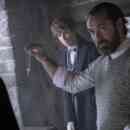Movie review: Loveless
The ghosts of the deceased Soviet ideal haunt Andrey Zvyagintsev’s story of a lost boy in the middle of a morphing Moscow as it shows us two parents more fascinated by their own phones than their son’s welfare.
Loveless
4/5
Starring: Maryana Spivak, Aleksey Rosin, Matvey Novikov
Directed by: Andrey Zvyagintsev
Running time: 2 hrs 7 mins
Rating: Restricted
By Katherine Monk
The ghosts of Socialism haunt every corner of Andrey Zvyagintsev’s (Leviathan) latest micro-masterpiece. They lurk in the dilapidated landscapes and derelict communal buildings neglected by the capitalist makeover. They howl, desperately, into the vacant souls of every character on screen. It’s the tin echo of their shrieks, ricocheting through abandoned space, that defines Loveless. It articulates the existential crisis of a broken promise — whether that be the promise of Socialism debased by greed and gangsterism, or a parent’s inherent duty to love and protect their child.
The movie focuses on the latter for plot, but it’s the cold fusion of the two that makes Loveless such a devastating tragedy because it extends the blast radius from personal ground zero, to universal, post-Nietzchean shock wave: God is dead, all over again.
It’s a dreadful voyage, filled with disappointment and disgust, but the Russian psyche has a way of turning human monstrosity into art. All that baroque emotion beaten down by years of oppression has prompted a numbness of spirit. A painful touch becomes a vaguely ironic tickle.
Zvyagintsev plays with your nerve-endings from the opening scene, set in the old-but-desirable apartments outside metropolitan Moscow.
A young couple is looking at the apartment currently occupied by Boris (Aleksy Rozin) and Zhenya (Maryana Spivak), as well as their 12-year-old son Alyosha (Matvey Novikov). We get the tour, the ambivalent sales-pitch, and then we get our first taste of something bitter.
Maryana doesn’t seem all that happy. She and Boris are in the midst of a nasty divorce. They spend their time together obsessing over their respective phones, hypnotized by the promise of this new world at their fingertips, yet perpetually out of reach.
Boris is hoping to get a promotion at work, fulfilling his dream of becoming an executive — complete with the younger mistress who worships him as a man and a provider. Maryana is already spending nights with her new catch: a handsome older man with a fancy new downtown condo and a successful business. Maryana and Boris hate each other, and when they aren’t looking through the magic mirror at their own desired selves, they’re bickering over who’s going to take care of Alyosha. He’s standing in the way of their dreams.
We watch as he overhears the conversation. The words seem to burn his skin. He turns red as his eyes water. Tears stream down his soft white cheeks. We’re right there — framed within hugging distance — as Alyosha feels the hurt of all hurts: No one wants me.
He disappears. Yet, it’s only until the next day they realize he’s even missing because both Mom and Dad were absent, thinking the other was home. And so begins the rest of the movie as we seek Alyosha in the ruins of old Moscow.
We’re right there — framed within hugging distance — as Alyosha feels the hurt of all hurts: No one wants me.
The ghosts creep along with us as we play hide and seek with the soul of socialism. They force us to look at the scraps of the Soviet dream; to see how the idea of taking care of each other fell into such disrepair.
Zvyagintsev never flinches from their cold grasp. Enabled by that sardonic Russian numbness, he makes us watch as Boris and Zhenya forever touch the glass on their devices, yet never touch their son. Then he makes them pay.
Yet, how does one pay for sin when already morally bankrupt? That’s the bigger question here, because the worse things get, the more numb these people become. Redemption is always flirting at the side of the frame, waiting for her big entrance — because that’s what we’re bringing to this drama: Hope.
We hope they’re going to find Alyosha. We hope for a happy ending.
Zvyagintsev gives us reason to believe when a trained volunteer group offers help in the search. Their personal activism is more effective than the police, and they honestly seem to care about lost kids. They provide the moral reconnaissance we need, as viewers, to get through the pitch black narrative.
Yet, hope is a dangerous thing. It overcomes the comfortable numbness of oppression and triggers a response. It might even make you feel something. After experiencing Loveless, you can see why the modern Russia chooses not to bother with the broken dream. Looking for it is too painful, and chances are, you’ll get hurt.
@katherinemonk
THE EX-PRESS, March 16, 2018
-30-





No Replies to "Loveless in a Literal State of Abandon"